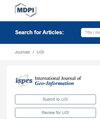Fine-Grained Metro-Trip Detection from Cellular Trajectory Data Using Local and Global Spatial–Temporal Characteristics
IF 2.8
3区 地球科学
Q2 COMPUTER SCIENCE, INFORMATION SYSTEMS
引用次数: 0
Abstract
A fine-grained metro trip contains complete information on user mobility, including the original station, destination station, departure time, arrival time, transfer station(s), and corresponding transfer time during the metro journey. Understanding such detailed trip information within a city is crucial for various smart city applications, such as effective urban planning and public transportation system optimization. In this work, we study the problem of detecting fine-grained metro trips from cellular trajectory data. Existing trip-detection approaches designed for GPS trajectories are often not applicable to cellular data due to the issues of location noise and irregular data sampling in cellular data. Moreover, most cellular data-based methods focus on identifying coarse-grained transportation modes, failing to detect fine-grained metro trips accurately. To address the limitations of existing works, we propose a novel and efficient fine-grained metro-trip detection (FGMTD) model in this work. By considering both the local and global spatial–temporal characteristics of a trajectory and the metro network, FGMTD can effectively mitigate the effects of location noise and irregular data sampling, ultimately improving the accuracy and reliability of the detection process. In particular, FGMTD employs a spatial–temporal hidden Markov model with efficient index strategies to capture local spatial–temporal characteristics from individual positions and metro stations, and a weighted trip-route similarity measure to consider global spatial–temporal characteristics from the entire trajectory and metro route. We conduct extensive experiments on two real datasets to evaluate the effectiveness and efficiency of our proposed approaches. The first dataset contains cellular data from 30 volunteers, including their actual trip details, while the second dataset consists of data from 4 million users. The experiments illustrate the significant accuracy of our approach (with a precision of 87.80% and a recall of 84.28%). Moreover, we demonstrate that FGMTD is efficient in detecting fine-grained trips from a large amount of cellular data, achieving this task within 90 min of processing a day’s data from 4 million users.利用局部和全局时空特征从蜂窝轨迹数据中进行精细的地铁旅行检测
细粒度的地铁行程包含用户移动的完整信息,包括地铁行程中的始发站、终点站、出发时间、到达时间、换乘站以及相应的换乘时间。了解城市中如此详细的行程信息对于各种智慧城市应用至关重要,例如有效的城市规划和公共交通系统优化。在这项工作中,我们研究了从蜂窝轨迹数据中检测细粒度地铁行程的问题。由于蜂窝数据中存在位置噪声和不规则数据采样等问题,现有的针对 GPS 轨迹设计的行程检测方法通常不适用于蜂窝数据。此外,大多数基于蜂窝数据的方法侧重于识别粗粒度的交通模式,无法准确检测细粒度的地铁出行。针对现有研究的局限性,我们在本研究中提出了一种新颖高效的细粒度地铁出行检测(FGMTD)模型。通过同时考虑轨迹和地铁网络的局部和全局时空特征,FGMTD 可以有效缓解位置噪声和不规则数据采样的影响,最终提高检测过程的准确性和可靠性。具体而言,FGMTD 采用空间-时间隐马尔可夫模型和高效的索引策略来捕捉单个位置和地铁站的局部空间-时间特征,并采用加权行程-路线相似性度量来考虑整个轨迹和地铁线路的全局空间-时间特征。我们在两个真实数据集上进行了大量实验,以评估所提出方法的有效性和效率。第一个数据集包含 30 名志愿者的手机数据,包括他们的实际行程细节;第二个数据集包含 400 万用户的数据。实验表明,我们的方法具有显著的准确性(精确度为 87.80%,召回率为 84.28%)。此外,我们还证明了 FGMTD 能够高效地从大量蜂窝数据中检测出细粒度的行程,在 90 分钟内处理了来自 400 万用户的一天数据。
本文章由计算机程序翻译,如有差异,请以英文原文为准。
求助全文
约1分钟内获得全文
求助全文
来源期刊

ISPRS International Journal of Geo-Information
GEOGRAPHY, PHYSICALREMOTE SENSING&nb-REMOTE SENSING
CiteScore
6.90
自引率
11.80%
发文量
520
审稿时长
19.87 days
期刊介绍:
ISPRS International Journal of Geo-Information (ISSN 2220-9964) provides an advanced forum for the science and technology of geographic information. ISPRS International Journal of Geo-Information publishes regular research papers, reviews and communications. Our aim is to encourage scientists to publish their experimental and theoretical results in as much detail as possible. There is no restriction on the length of the papers. The full experimental details must be provided so that the results can be reproduced.
The 2018 IJGI Outstanding Reviewer Award has been launched! This award acknowledge those who have generously dedicated their time to review manuscripts submitted to IJGI. See full details at http://www.mdpi.com/journal/ijgi/awards.
 求助内容:
求助内容: 应助结果提醒方式:
应助结果提醒方式:


